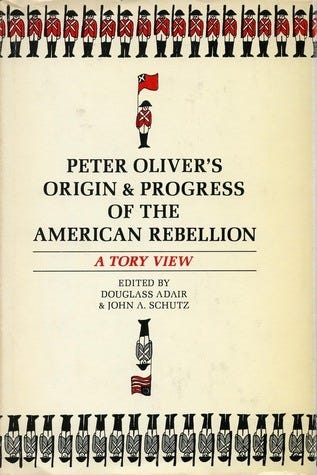This is the first part of Peter Oliver’s Origin and Progress of the American Rebellion: A Tory View.
This book is a glimpse into a world deliberately occluded by American historians. From the introduction:
“It is understandable, therefore, that an account of rebellion that offends patriot sensibilities as Peter Oliver’s does - by attacking the hallowed traditions of the revolution, challenging the motives of the founding fathers, and depicting revolution as passion, plotting, and violence - would receive rough treatment from patriot writers and thus would not be published.”
[…]
“We shall never know how much evidence was purposely destroyed by the patriots; all we know is that quantities were burned.”1
Published in 1961, this fascinating primary source exposes a side of the legendary American Revolution that has been ignored by American scholars of every possible political persuasion. Generally speaking, the population of the nascent United States was split into thirds regarding the colonial rebellion: one third supported separation, on third opposed it, and one third couldn’t really be bothered to have an opinion. Contrary to the soaring rhetoric continually imbibed by Republicans, conservatives, and those who think The Patriot is a documentary, the soon-to-be-Americans of the era were less than resplendent:
“Before the war, the American people, though they did not live in luxury, enjoyed in abundance every requisite to make life comfortable and happy; they passed great part of their time either in smoking, drinking tea[,] or spirituous liquors. Such was the disposition of these people. Sore against the grain then, as it must be of a sudden, the transform into soldiers, reduced to lead a life of hardships and frugality, it would not be surprising that they should prefer the yoke of the English to a liberty purchased at the expense of the comforts of life.”2
Likewise, the hilariously deceitful image of the wealthy & well-to-do slave holding aristocrat portrayed by the current university akademic apparatchiks is off base. Like every assemblage of European stocks in history, there was a small amount of highly educated, highly intelligent upper elite, a slightly larger group of successful yet yearning liminal elites, and a vast crowd of middle and lower classes, content to work as little as possible for as much as they could get.
My goal with this project is a general demystification of the origins of this country which I love above all others, the most beautiful land on earth, and the home to everyone I respect and hold dear. As we hurtle ever faster towards a Great Moment in our shared history, it is more important than ever to truly understand who we are and where we came from to decide what we wish to be and where we wish to go.
I plan to record and upload each chapter independently, and I will follow up Origins & Progress with Volume I of The History of the Origin, Progress, and Termination of the American War, by Charles Stedman.
Douglas Adair & John A. Schutz
Colonel M. Du Portail, French Minister at War in 1791, acting Brigadier-General in the American army during the rebellion.









